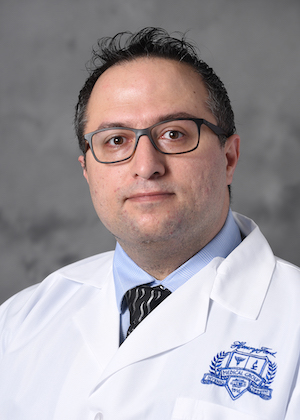First Year Resident Recounts his Illness

DETROIT – When Mohamed Fayed, an anesthesiology resident physician with Henry Ford Hospital, tested positive for COVID-19, his first concern was not to himself but how he would not be able to continue working with his team on the frontlines.
“I still have the email. I’ll never forget it. It basically said, ‘I just can’t wait to get back to the front lines,’” recalls Nicholas Yeldo, M.D., director for the Anesthesiology Residency program at the hospital and Dr. Fayed’s supervisor. “Our message to him was, ‘Hey Mohamed, take a break and take care of yourself and we’ll check on you.’”
Dr. Fayed tested positive for the coronavirus on March 30. He immediately sent his wife and daughter to stay at an Airbnb while he quarantined himself at home.
In the midst of redeploying his residents, Dr. Yeldo, who also works in the intensive care unit, continued to check in on his resident’s condition. “We were doing our best to stay in touch with him, by text and email, knowing that he was now all alone in his apartment,” Dr. Yeldo says.
During one of those check ins, Dr. Fayed didn’t respond for a number of hours. Toward the end of the day, Dr. Yeldo received a “frightened response” from his resident.
“He just sounded horrible, he couldn’t breathe normal and couldn’t catch his breath,” Dr. Yeldo recalls. “I told him he needed to go to the Emergency Department immediately.” Dr. Fayed was subsequently admitted and hospitalized for five days in the intensive care unit.
Dr. Yeldo continued to check on his resident but was not part of the care team., “He was struggling. He was breathing really fast. Probably, three to four times the normal breathing rate,” says Dr. Yeldo. “It was at 90 percent, usually (the normal breathing rate) it’s 99.”
Dr. Fayed was released from the hospital on April 14 and has been recovering at home since his discharge. He believes Dr. Yeldo’s insistence that he go to the Emergency Department “saved my life.”
“Without him urging me, I would not have gone,” says Dr. Fayed, 40, a native of Egypt who began his medical training in March 2019 at Henry Ford.
During his hospitalization, Dr. Fayed was concerned for his wife Mona and his daughter, Zeina, who turned four on April 18. He celebrated the birthday with them both via Zoom from his hospital bed. Their relatives live in Washington D.C. and Virginia.
Dr. Yeldo filled a support role as a family surrogate by providing updates to Mrs. Fayed and their family. “I’m very grateful to him for that,” Dr. Fayed says.
“Dr. Yeldo clearly was holding so much of this pain and trauma and worry, for not just his teammate who had fallen ill but also for the team who was caring for him, for the nurses, for the level of responsibility that everyone felt, not just for Dr. Fayed but for all of their patients,” says Rana Awdish, M.D., a critical care medicine physician and director of the Pulmonary Hypertension Program at Henry Ford . “You’re shouldering so much responsibility and I could see that so much for him that it had become truly a personal mission.”
Dr. Fayed’s experience has provided a unique perspective of COVID-19, both as a medical worker and as a patient, one that he will share with his team when he returns to work. ”From my experience, I didn’t realize how painful everything would be. I want to make sure that our patients don’t go through the same pain,” he says.
It’s been a learning experience for Dr. Yeldo as well. “What I realized is that you always have to follow your intuition. You can’t second-guess yourself or hesitate. When you think someone needs help, help them,” he said. “Don’t wait, don’t say ‘I’ll get to it tomorrow’ or ‘in an hour’ or ‘he’ll be fine’. You can never do too much to help people, and that’s the message to me.”
Dr. Fayed was tested on April 28 and the results showed he has developed the COVID-19 antibodies. He recently signed up to donate plasma so that he can help other patients, “I will do four plasma donation sessions and each session can help four patients,” he said. He’s hopeful that as many as 16 patients will benefit from his convalescent plasma. This plasma from people who have fully recovered from COVID-19 and contains antibodies that attack the virus is being evaluated as a treatment for coronavirus patients.
Dr. Fayed has been cleared to go back to work and has started a gradual transition process to return to his full-time role in the near future. Dr. Fayed started seeing his wife and daughter a few days ago and is once again enjoying taking short walks with his family.
###
MEDIA CONTACT: Sal Giacona / sgiacon1@hfhs.org /(313) 421-9108
.svg?iar=0&hash=F6049510E33E4E6D8196C26CCC0A64A4)

/hfh-logo-main--white.svg?iar=0&hash=ED491CBFADFB7670FAE94559C98D7798)









